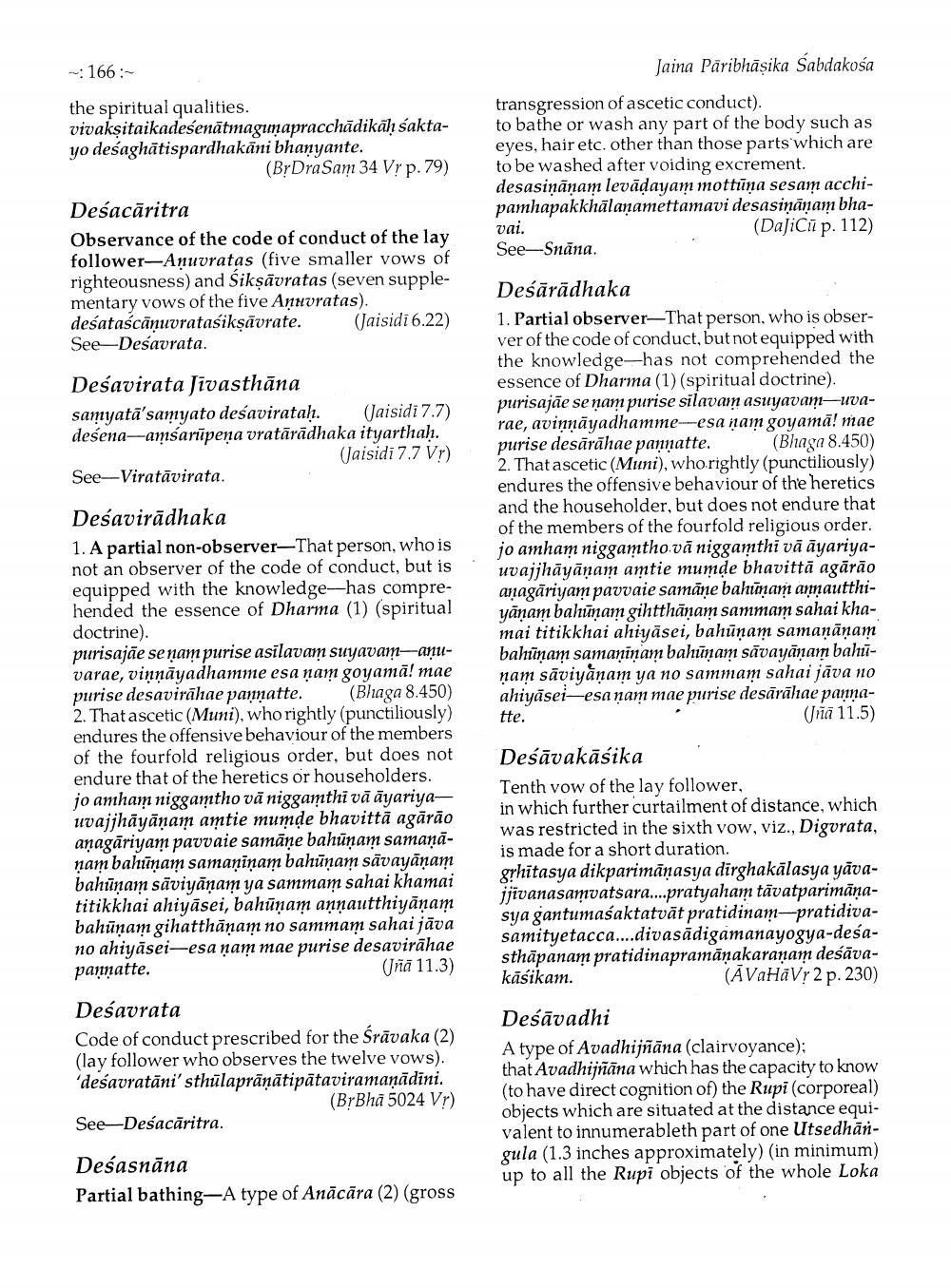________________
Jaina Pāribhāṣika Sabdakosa
166:the spiritual qualities. vivaksitaikadesenātmagunapracchädikāḥ saktayo deśaghātispardhakāni bhanyante.
(BrDra Sam 34 Vr p.79)
transgression of ascetic conduct). to bathe or wash any part of the body such as eyes, hair etc. other than those parts which are to be washed after voiding excrement. desasiņāņam levādayam mottuna sesam acchipamhapakkhālaŋamettamavi desasiņānam bhaναι.
(DaJiCū p. 112) See-Snāna.
Desacāritra Observance of the code of conduct of the lay follower-Anuvratas (five smaller vows of righteousness) and Sikşāvratas (seven supplementary vows of the five Annvratas). desatascānuvratasikşāvrate. (Jaisidi6.22) See Deśavrata.
Desavirata Jivasthāna samyatā'samyato deśavirataḥ. (Jaisidi 7.7) desena-amsarūpeņa vratārādhaka ityarthah.
(Jaisidi 7.7 Vr) See-Viratāvirata.
Desārādhaka 1. Partial observer-That person who is observer of the code of conduct, but not equipped with the knowledge-has not comprehended the essence of Dharma (1) (spiritual doctrine). purisajāe se nam purise silavain asuyavam-uvarae, avinnāyadhamme-esanam goyamā! mae purise desārāhae pannatte. (Bhaga 8.450) 2. That ascetic (Muni), who.rightly (punctiliously) endures the offensive behaviour of the heretics and the householder, but does not endure that of the members of the fourfold religious order. jo amham niggamtho.vā niggamthi vā āyariyauvajjhāyāṇam amtie mumde bhavittā agārāo anagāriyam pavvaie samāne bahūnam annautthiyāņam bahūnam gihtthānam sammam sahai khamai titikkhai ahiyāsei, bahūņam samaņāņam bahünam samaniņam bahüņam sāvayānam bahuņam sāviyåņam ya no sammam sahai jāva no ahiyāsei-esa nam mae purise desārālae pannatte.
(Jria 11.5)
Desavirādhaka 1. A partial non-observer-That person, who is not an observer of the code of conduct, but is equipped with the knowledge-has comprehended the essence of Dharma (1) (spiritual doctrine). purisajāe se nam purise asilavam suyavam-anuvarae, vinnāyadhamme esa nam goyamā! mae purise desavirāhae pannatte. (Bhaga 8.450) 2. That ascetic (Muni), who rightly (punctiliously) endures the offensive behaviour of the members of the fourfold religious order, but does not endure that of the heretics or householders. jo amham niggamtho vā niggamthi vā āyariyauvajjhāyānam amtie mumde bhavittā agārão aņagāriyam pavvaie samāṇe bahūņam samaņāņam bahtīņam samanīņam bahūņam sāvayānam bahūnam sāviyānam ya sammam sahai khamai titikkhai ahiyāsei, bahūņam annautthiyānam bahūņam gihatthānam no sammam sahai jāva no ahiyāsei-esa ņam mae purise desavirāhae pannatte.
(Jna 11.3)
Deśāvakāsika Tenth vow of the lay follower, in which further curtailment of distance, which was restricted in the sixth vow, viz., Digvrata, is made for a short duration. grhitasya dikparimāṇasya dirghakālasya yāvajjivanasamvatsara....pratyaham tāvatparimāņasya gantumasaktatvāt pratidinam-pratidivasamityetacca....divasādigamanayogya-desasthāpanam pratidinapramănakaranam deśāvakāśikam.
(ĀVaHāVļ2 p. 230)
Desavrata Code of conduct prescribed for the Šrāvaka (2) (lay follower who observes the twelve vows). 'deśavratāni' sthūlaprāņātipātaviramaņādini.
(BrBhā 5024 Vr) See-Desacāritra.
Deśāvadhi A type of Avadhijñāna (clairvoyance); that Avadhijñāna which has the capacity to know (to have direct cognition of) the Rupi (corporeal) objects which are situated at the distance equivalent to innumerableth part of one Utsedhāngula (1.3 inches approximately) (in minimum) up to all the Rupi objects of the whole Loka
Desasnāna Partial bathing-A type of Anācāra (2) (gross




